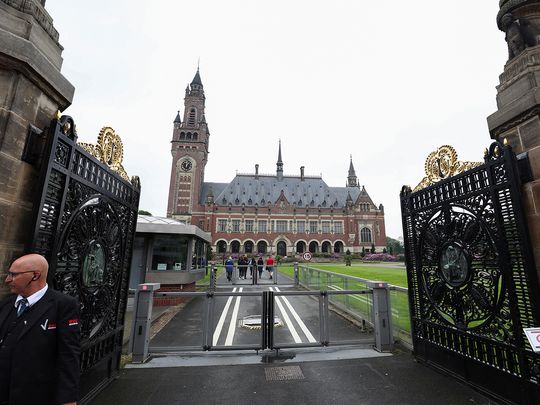
When the UN Partition Plan was adopted by the UN General Assembly back in 1947, Syrian representative to the UN Fares Al Khoury objected, demanding that the matter is taken to the newly established International Court of Justice (ICJ).
The ICJ was founded to adjudicate disputes between nations and offer advisory opinion when asked. It got its first case in May 1947; not about Palestine, but rather, regarding a sea-mine dispute between Great Britain and Albania.
Khoury saw great promise in the ICJ and as an internationally acclaimed legal mind, was nominated to serve on its first 15-man judge panel in 1948. Addressing the issue of Palestinian rights, he said: “The power of justice ought to be stronger than justice imposed militarily.”
Although himself a Protestant Christian, he quoted Abu Bakr Al Siddiq, the first caliph of Islam, saying: “The strong among you will be weak until we extract from him justice, and the weak will be strong until I obtain justice for him.”
Khoury also quoted Mahatma Gandhi, who had been gunned down in January 1948: “Palestine belongs to the Arabs in the same sense as England belongs to the English and France to the French.”
Khoury’s bid to take the matter to the World Court failed, and so did the Arab bid to make him judge at the ICJ. He would have never imagined that 77-years later, the ICJ would return to the issue of Palestine, granting it long-denied justice.
The 2024 verdict
Fares Al Khoury’s words return to the limelight after the ICJ’s most recently ruling on 19 July 2024, saying that Israel’s continued presence in Palestine was “illegal.”
The verdict was read out by the ICJ’s newly elected president Nawaf Salam, whose grandfather had rubbed-shoulders with Khoury in the Syrian National Congress of 1919. Like Khoury, he too was a former professor of international law at the prestigious American University of Beirut (AUB).
The ICJ condemned the building of settlements in the West Bank and East Jerusalem, given that they were occupied territories since 1967 that should return to their rightful owners.
Israel has no sovereignty over these territories, ICJ added, describing its actions as a violation of international law and scrapping Israel’s long-held claims that East Jerusalem had been inhabited by Jews from Biblical times.
And in part of the ruling that many saw as targeting the US and Great Britain, the ICJ added that the international community should not “render aid or assistance.” Settlement construction should come to a halt and existing ones should be immediately dismantled, the court added, describing Israel as an “occupying power.”
Palestinians were thrilled by the verdict, with their foreign minister Riad Al Malki saying that the ICJ had “fulfilled its legal and moral duties.” For its part, Israel condemned the ruling as “fundamentally wrong.”
What comes next?
Although the ICJ ruling was non-binding, it further complicates matters for all countries providing Israel with military aid and blanket support for the current war in Gaza.
Coming after a similar case was brought up by South Africa against Israel, it reminds us of a verdict by the ICJ against South Africa’s Apartheid regime back in 1971, when it described the country’s continued colonial presence in Namibia as “illegal.” Then too, the ICJ called for immediate withdrawal, empowering the Namibian national movement and eventually leading to the independence of Namibia in March 1990.
Will history repeat itself with Palestine? Netanyahu will ignore the verdict, but that will be more difficult for the UK’s new Prime Minister Keir Starmer, who wouldn’t want to start his premiership with an open confrontation with the international community and the ICJ.
Although US President Joe Biden has too much on his hands at present to pay any real attention to the verdict — especially if he decides to step down and make way for Kamala Harris — the ICJ decision will loom over any forthcoming administration, whether Democratic or Republican.
It may not end the occupation of Palestine, but it will create a moral threshold for the entire world order, carved in history books for eternity.
— Sami Moubayed is a historian and former Carnegie scholar. He is also author of the best-seller Under the Black Flag: At the frontier of the New Jihad.









